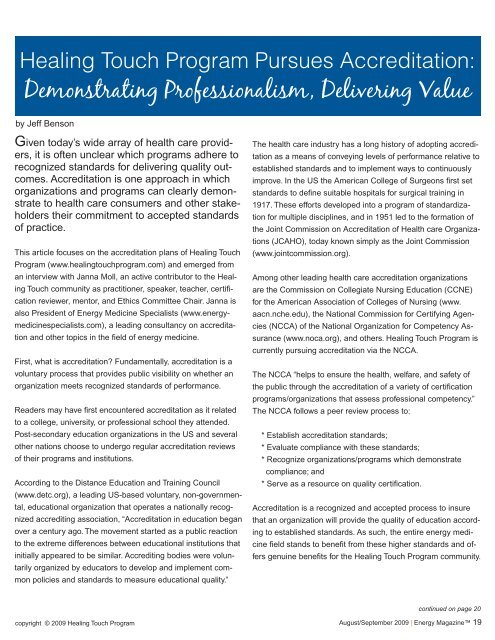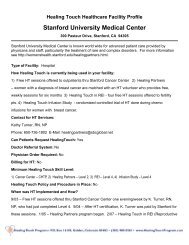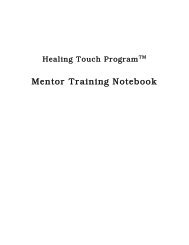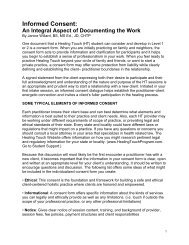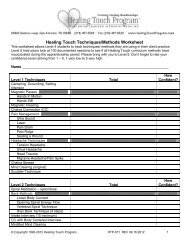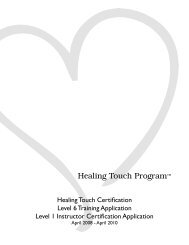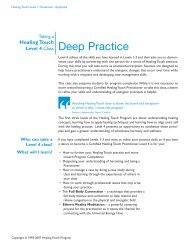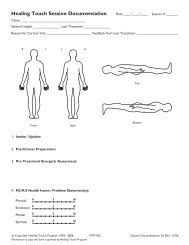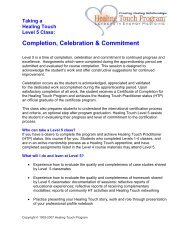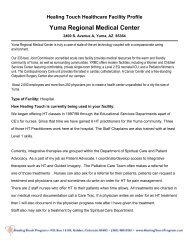August/September 2009: Healing Touch ... - Energy Magazine
August/September 2009: Healing Touch ... - Energy Magazine
August/September 2009: Healing Touch ... - Energy Magazine
You also want an ePaper? Increase the reach of your titles
YUMPU automatically turns print PDFs into web optimized ePapers that Google loves.
<strong>Healing</strong> <strong>Touch</strong> Program Pursues Accreditation:<br />
Demonstrating Professionalism, Delivering Value<br />
by Jeff Benson<br />
Given today’s wide array of health care providers,<br />
it is often unclear which programs adhere to<br />
recognized standards for delivering quality outcomes.<br />
Accreditation is one approach in which<br />
organizations and programs can clearly demonstrate<br />
to health care consumers and other stakeholders<br />
their commitment to accepted standards<br />
of practice.<br />
This article focuses on the accreditation plans of <strong>Healing</strong> <strong>Touch</strong><br />
Program (www.healingtouchprogram.com) and emerged from<br />
an interview with Janna Moll, an active contributor to the <strong>Healing</strong><br />
<strong>Touch</strong> community as practitioner, speaker, teacher, certification<br />
reviewer, mentor, and Ethics Committee Chair. Janna is<br />
also President of <strong>Energy</strong> Medicine Specialists (www.energymedicinespecialists.com),<br />
a leading consultancy on accreditation<br />
and other topics in the field of energy medicine.<br />
First, what is accreditation Fundamentally, accreditation is a<br />
voluntary process that provides public visibility on whether an<br />
organization meets recognized standards of performance.<br />
Readers may have first encountered accreditation as it related<br />
to a college, university, or professional school they attended.<br />
Post-secondary education organizations in the US and several<br />
other nations choose to undergo regular accreditation reviews<br />
of their programs and institutions.<br />
According to the Distance Education and Training Council<br />
(www.detc.org), a leading US-based voluntary, non-governmental,<br />
educational organization that operates a nationally recognized<br />
accrediting association, “Accreditation in education began<br />
over a century ago. The movement started as a public reaction<br />
to the extreme differences between educational institutions that<br />
initially appeared to be similar. Accrediting bodies were voluntarily<br />
organized by educators to develop and implement common<br />
policies and standards to measure educational quality.”<br />
The health care industry has a long history of adopting accreditation<br />
as a means of conveying levels of performance relative to<br />
established standards and to implement ways to continuously<br />
improve. In the US the American College of Surgeons first set<br />
standards to define suitable hospitals for surgical training in<br />
1917. These efforts developed into a program of standardization<br />
for multiple disciplines, and in 1951 led to the formation of<br />
the Joint Commission on Accreditation of Health care Organizations<br />
(JCAHO), today known simply as the Joint Commission<br />
(www.jointcommission.org).<br />
Among other leading health care accreditation organizations<br />
are the Commission on Collegiate Nursing Education (CCNE)<br />
for the American Association of Colleges of Nursing (www.<br />
aacn.nche.edu), the National Commission for Certifying Agencies<br />
(NCCA) of the National Organization for Competency Assurance<br />
(www.noca.org), and others. <strong>Healing</strong> <strong>Touch</strong> Program is<br />
currently pursuing accreditation via the NCCA.<br />
The NCCA “helps to ensure the health, welfare, and safety of<br />
the public through the accreditation of a variety of certification<br />
programs/organizations that assess professional competency.”<br />
The NCCA follows a peer review process to:<br />
* Establish accreditation standards;<br />
* Evaluate compliance with these standards;<br />
* Recognize organizations/programs which demonstrate<br />
compliance; and<br />
* Serve as a resource on quality certification.<br />
Accreditation is a recognized and accepted process to insure<br />
that an organization will provide the quality of education according<br />
to established standards. As such, the entire energy medicine<br />
field stands to benefit from these higher standards and offers<br />
genuine benefits for the <strong>Healing</strong> <strong>Touch</strong> Program community.<br />
continued on page 20<br />
copyright © <strong>2009</strong> <strong>Healing</strong> <strong>Touch</strong> Program <strong>August</strong>/<strong>September</strong> <strong>2009</strong> | <strong>Energy</strong> <strong>Magazine</strong> 19


